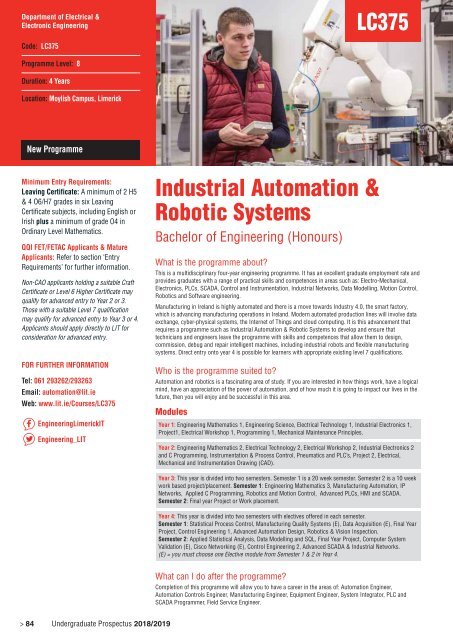LIT_fulltime2017
Create successful ePaper yourself
Turn your PDF publications into a flip-book with our unique Google optimized e-Paper software.
Department of Electrical &<br />
Electronic Engineering<br />
LC375<br />
Code: LC375<br />
Programme Level: 8<br />
Duration: 4 Years<br />
Location: Moylish Campus, Limerick<br />
New Programme<br />
Minimum Entry Requirements:<br />
Leaving Certificate: A minimum of 2 H5<br />
& 4 O6/H7 grades in six Leaving<br />
Certificate subjects, including English or<br />
Irish plus a minimum of grade O4 in<br />
Ordinary Level Mathematics.<br />
QQI FET/FETAC Applicants & Mature<br />
Applicants: Refer to section ‘Entry<br />
Requirements’ for further information.<br />
Non-CAO applicants holding a suitable Craft<br />
Certificate or Level 6 Higher Certificate may<br />
qualify for advanced entry to Year 2 or 3.<br />
Those with a suitable Level 7 qualification<br />
may qualify for advanced entry to Year 3 or 4.<br />
Applicants should apply directly to <strong>LIT</strong> for<br />
consideration for advanced entry.<br />
FOR FURTHER INFORMATION<br />
Tel: 061 293262/293263<br />
Email: automation@lit.ie<br />
Web: www.lit.ie/Courses/LC375<br />
EngineeringLimerickIT<br />
Engineering_<strong>LIT</strong><br />
Industrial Automation &<br />
Robotic Systems<br />
Bachelor of Engineering (Honours)<br />
What is the programme about?<br />
This is a multidisciplinary four-year engineering programme. It has an excellent graduate employment rate and<br />
provides graduates with a range of practical skills and competences in areas such as: Electro-Mechanical,<br />
Electronics, PLCs, SCADA, Control and Instrumentation, Industrial Networks, Data Modelling, Motion Control,<br />
Robotics and Software engineering.<br />
Manufacturing in Ireland is highly automated and there is a move towards Industry 4.0, the smart factory,<br />
which is advancing manufacturing operations in Ireland. Modern automated production lines will involve data<br />
exchange, cyber-physical systems, the Internet of Things and cloud computing. It is this advancement that<br />
requires a programme such as Industrial Automation & Robotic Systems to develop and ensure that<br />
technicians and engineers leave the programme with skills and competences that allow them to design,<br />
commission, debug and repair intelligent machines, including industrial robots and flexible manufacturing<br />
systems. Direct entry onto year 4 is possible for learners with appropriate existing level 7 qualifications.<br />
Who is the programme suited to?<br />
Automation and robotics is a fascinating area of study. If you are interested in how things work, have a logical<br />
mind, have an appreciation of the power of automation, and of how much it is going to impact our lives in the<br />
future, then you will enjoy and be successful in this area.<br />
Modules<br />
Year 1: Engineering Mathematics 1, Engineering Science, Electrical Technology 1, Industrial Electronics 1,<br />
Project1, Electrical Workshop 1, Programming 1, Mechanical Maintenance Principles.<br />
Year 2: Engineering Mathematics 2, Electrical Technology 2, Electrical Workshop 2, Industrial Electronics 2<br />
and C Programming, Instrumentation & Process Control, Pneumatics and PLC’s, Project 2, Electrical,<br />
Mechanical and Instrumentation Drawing (CAD).<br />
Year 3: This year is divided into two semesters. Semester 1 is a 20 week semester. Semester 2 is a 10 week<br />
work based project/placement. Semester 1: Engineering Mathematics 3, Manufacturing Automation, IP<br />
Networks, Applied C Programming, Robotics and Motion Control, Advanced PLCs, HMI and SCADA.<br />
Semester 2: Final year Project or Work placement.<br />
Year 4: This year is divided into two semesters with electives offered in each semester.<br />
Semester 1: Statistical Process Control, Manufacturing Quality Systems (E), Data Acquisition (E), Final Year<br />
Project, Control Engineering 1, Advanced Automation Design, Robotics & Vision Inspection.<br />
Semester 2: Applied Statistical Analysis, Data Modelling and SQL, Final Year Project, Computer System<br />
Validation (E), Cisco Networking (E), Control Engineering 2, Advanced SCADA & Industrial Networks.<br />
(E) = you must choose one Elective module from Semester 1 & 2 in Year 4.<br />
What can I do after the programme?<br />
Completion of this programme will allow you to have a career in the areas of: Automation Engineer,<br />
Automation Controls Engineer, Manufacturing Engineer, Equipment Engineer, System Integrator, PLC and<br />
SCADA Programmer, Field Service Engineer.<br />
> 84 Undergraduate Prospectus 2018/2019









